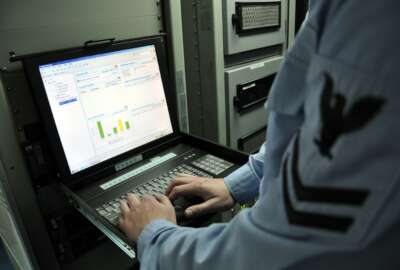The Coast Guard launches a new job class to strengthen its cyber capabilities
The Coast Guard will establish a new rating next year called cyber mission specialist. Officials hope it will attract new recruits and strengthen the Coast Guar...
Best listening experience is on Chrome, Firefox or Safari. Subscribe to Federal Drive’s daily audio interviews on Apple Podcasts or PodcastOne.
The Coast Guard will establish a new rating next year called cyber mission specialist. Officials hope it will attract new recruits and strengthen the Coast Guard’s ability to carry out its cyber mission. Joining the Federal Drive with Tom Temin with details, the chief of the Coast Guard’s Cyberspace Forces, Capt. Alain Balmaceda.
Interview transcript:
Tom Temin: Capt. Balmaceda, good to have you on.
Alain Balmaceda: Hey, thank you very much. Appreciate the opportunity to come speak about the Coast Guard rating.
Tom Temin: And why don’t we start with the higher view here and tell us about the cyber mission and how cyberspace forces in the Coast Guard relate to it.
Alain Balmaceda: Much like the rest of the Department of Defense as well as other agencies. You know, the Coast Guard is really posturing to embrace the cyber domain as a true operational domain amongst all its traditional domains. So the Coast Guard in its opportunity has updated its Coast Guard Cyber strategy through a strategic outlook and pushed out new focused lines of efforts that really hone in on our need to establish a good posturing in the cyberspace domain.
Tom Temin: Does that mean guarding against cyber threats to the Coast Guard? But does it also include looking in cyberspace more carefully or more thoroughly for clues to issues that might come within the Coast Guard’s domains, such as smuggling for example?
Alain Balmaceda: Absolutely. So the Coast Guard’s three lines of efforts under its new strategy kind of align to exactly what you’re talking about. So the first line of effort is to defend and operate the enterprise mission platform. So the enterprise mission platform is all of this technology that the Coast Guard uses, that is our part of the Department of Defense’s infrastructure network. Line of effort two is protect the marine transportation system. With the marine transportation system, the Coast Guard wants to leverage its traditional prevention and response frameworks to promote cyber risk management and implement unified response plans to address cyber threats in the marine transportation system. And then last but not least, is our third line of effort, which is to operate in and through cyberspace. Through our role in DHS as well as through the DoD is joint force, we intend to execute operations through law enforcement and military spectrums to impose costs on malicious cyber activity as well as to nation state adversaries.
Tom Temin: All right, so in that regard, you’re looking for new people that will be called Cyber Mission Specialists, these are people that enlist with this in mind, or will it also include people that might want to say, hey, I’d like to do this too. And I’m, I’m already in the Coast Guard.
Alain Balmaceda: Absolutely. The first part to that is definitely we’re trying to leverage the current workforce that we have, and enable them to essentially pursue a direct opportunity in cyber operations. So we will be leveraging a lot of our current members that are rated otherwise, and then, at the E-5 level, enable them to lateral into this new cyber rating.
Tom Temin: And what is the boatswain’s mate, and that’s part of what this billet would come under?
Alain Balmaceda: No, it would be its own rating. It’s one of the 22 ratings that we traditionally have, the cyber mission specialist will be its 23rd newest rating. So what we would be pulling from is those traditional 22 ratings that are currently available. So the ones that you identified, one like a boatswain’s mate, would have that opportunity based on his experience, his opportunities, his level of interest and certifications and be able to transition into a new cyber rating if he or she chooses to go down that road.
Tom Temin: We’re speaking with Capt. Alain Balmaceda, he’s chief of the Coast Guard’s cyberspace forces. And suppose someone seeing you know, they are a boatswain’s mate or some other function or they’re thinking of enlisting in the Coast Guard, can they be a cyber Mission Specialist, do you envision but also be at sea? Or is this simply an at shore, desk type of job?
Alain Balmaceda: No, cyber operations in its nature, you know, crosses over into all of the different mission sets. And it’s a supporting role in all of those domains. So we would envision not only obviously, there’s desk work within any job, but from the Coast Guard mission set, a cyber rating mission specialist will have the greater opportunity to, like we identified in our strategic outlook, really focus in on defending and protecting the marine transportation system, which is not only our own Coast Guard system, but it’s also the facilities as well as the vessels that operate globally and throughout the world.
Tom Temin: Yeah, so in other words, there are cyber assets and cyber capabilities aboard Coast Guard vessels that people would man in that case if they’re at sea.
Alain Balmaceda: Eventually we will have folks again, fully embedded within all the different mission areas, whether it be cuter afloat, ashore at sectors are within our prevention or response duty assignments.
Tom Temin: And you mentioned that this is a competitive rating the people would achieve, what types of folks, what types of qualifications are you looking for here?
Alain Balmaceda: One of the critical pieces in qualification is the prerequisite to be able to achieve and maintain a top secret SCI clearance with a polygraph. So being able to get over that hurdle, and be able to maintain that clearance is obviously one of the most demanding skill sets that is required to essentially start that career path. Outside of the technical nature of the rating itself and the experience that it requires with through certifications, advanced training and a significant amount of experience.
Tom Temin: And what’s the timeline here, this rating will be available looks like next year, but not quite in 2022?
Alain Balmaceda: That’s correct. We announced it, and we’re on track to essentially kick it off and have its first implementation starting in the 2023 timeframe. You know, that first initial opportunity to kind of join into that community with our end state goal of reaching probably about 300 people is what we’re looking at, 300 billets within the the rating to mature in and around the 2025 timeframe.
Tom Temin: And you mentioned of course, the Coast Guard’s work with the Defense Department. Coast Guard is also part of Homeland Security. And that has a pretty big cyber mission, too. So I imagine there’s a lot of interplay with say Customs and Border Protection, Immigration and Customs Enforcement and other elements of DHS, too, for the Coast Guard billets here.
Alain Balmaceda: Absolutely. That’s what makes the U.S. Coast Guard. so unique, right, is the fact that we do have a defense readiness capability but at the same time we fall under DHS and have a lot of different functions, including humanitarian efforts. So with that in mind, the cyber rating, what we offer through the Coast Guard is going to be a lot different maybe and in alignment with what has been developed and established through the joint force of DoD. So the Coast Guard you know, will have Coast Guard members in the cyber rating mission specialists will definitely have a broader view of the interagency and be able to operate and gain experience through different venues.
Tom Temin: Capt. Alain Balmaceda is chief of the Coast Guard cyberspace forces. Thanks so much for joining me.
Alain Balmaceda: Thank you. Appreciate it again.
Copyright © 2024 Federal News Network. All rights reserved. This website is not intended for users located within the European Economic Area.
Tom Temin is host of the Federal Drive and has been providing insight on federal technology and management issues for more than 30 years.
Follow @tteminWFED






